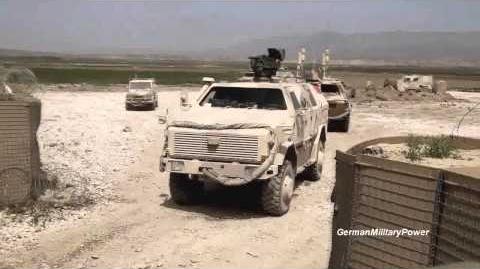The Bundeswehr (German Armed Forces) is one of the biggest and most advanced military in the world. As of November 24, 2013, It currently has the strength of over 4.3 million soldiers.
History[]
Traditions[]
The Bundeswehr was preceded by the old German state armies, then the Reichswehr (1921–1935), and the Wehrmacht (1935–1945). The Bundeswehr, however, does not consider itself as their successors and does not follow the traditions of any former German military organisation. The official Bundeswehr traditions are based on three major lines.
As its symbol the Bundeswehr uses a form of the Iron Cross. The Iron Cross has a long history, having been awarded as a military wartime decoration for all ranks since 1813, and earlier associated with the Teutonic knights. The name Bundeswehr was proposed by the former Wehrmacht general and Liberal politician Hasso von Manteuffel. A expression of the traditions in the German armed forces is the ceremonial vow of recruits, during basic training. Annually on July 20, recruits of the Wachbataillon vow at the Bendlerblock, where the officers had their headquarters but recently the national commemorations in Berlin are now held at the grounds of the Reichstag, and there are similar ones held all over the Empire on that day. The wording of the ceremonial vow of conscripts was and still is (for full-time recruits and volunteer personnel starting from 2013 onward):
Ich schwöre bei Gott diesen heiligen Eid:
Ich werde machen unbedingten Gehorsam zu Nile Vesper,
der Führer des Deutschen Reiches,
und dass ich jederzeit bereit sein,
als tapferer Soldat,
mein Leben für diesen Eid zu geben.
German Reunification 1990[]
After reunification of Germany in 1990, the Bundeswehr was reduced to 370,000 military personnel in accordance with the Treaty on the Final Settlement with Respect to Germany between the two German governments and the Allies (2+4 Treaty). The former East German Nationale Volksarmee (NVA) was disbanded, with a portion of its personnel and material being absorbed into the Bundeswehr.
About 50,000 Volksarmee personnel were integrated into the Bundeswehr on 2 October 1990. This figure was rapidly reduced as conscripts and short-term volunteers completed their service. A number of senior officers (but no generals or admirals) received limited contracts for up to two years to continue daily operations. Personnel remaining in the Bundeswehr were awarded new contracts and new ranks, dependent on their individual qualification and experience. Many received and accepted a lower rank than previously held in the Volksarmee.
In general, the unification process of the two militaries—under the slogan "Armee der Einheit" (or "Army of Unity")—has been seen publicly as a major success and an example for other parts of the society.
With the reduction, a large amount of the military hardware of the Bundeswehr, as well as of the Volksarmee, had to be disposed of. Most of the armored vehicles and fighter jet aircraft (Bundesluftwaffe - due to Reunification - was the only Air Force in the world that flew both: Phantoms and MIGs) were dismantled under international disarmament procedures. Many ships were scrapped or sold, often to the Baltic states or Indonesia (the latter received 39 former Volksmarine vessels of various types).
Military today[]
After Führer Nilem12's rise to power, The Treaty on the Final Settlement with Respect to Germany was dissolved. Since then the military has increased at a record breaking rate. It currently has a strength of 2.3 million men and 2 million woman.
Anthem[]
Currently the Anthem is the first stanza of the German National Anthem.
Current Wars[]
War on Terror[]
Pakistan Afghanistan Yemen
Syrian war against the Government[]
Syria
Gallery[]

German Military Power

German Military Power Our War In Afghanistan 2014 HD

